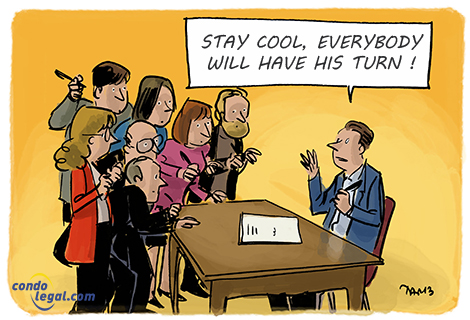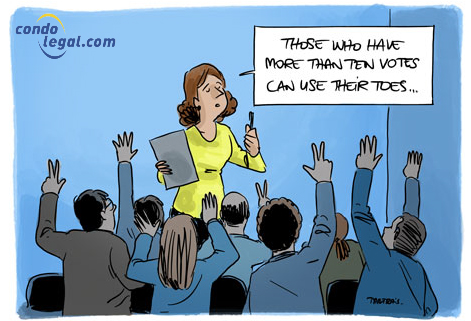Proxy (power of attorney) for the meeting of the co-owners
 During a meeting of co-owners, important decisions are made for each member of the co-ownership. These meetings are crucial as they determine the future management and maintenance of the property. Whether for alteration or improvement of the common portions, the election of the members of the board of directors, it is up to the co-owners to decide. However, if a co-owner is absent and has not taken care to be represented at the meeting, his vote may be sorely lacking. This may also prevent the obtaining of a quorum and consequently the holding of the meeting of co-owners.
During a meeting of co-owners, important decisions are made for each member of the co-ownership. These meetings are crucial as they determine the future management and maintenance of the property. Whether for alteration or improvement of the common portions, the election of the members of the board of directors, it is up to the co-owners to decide. However, if a co-owner is absent and has not taken care to be represented at the meeting, his vote may be sorely lacking. This may also prevent the obtaining of a quorum and consequently the holding of the meeting of co-owners.
A right of representation
When a co-owner cannot go there, he can ask the person of his choice to represent him. The mandatary the one who receives the proxy is not necessarily another co-owner. It may be a person outside the co-ownership. The latter will thus be able to represent him in this meeting and vote in his place on all the questions on the agenda.
A written instrument is compulsory
Tacit mandate being excluded, you must give a written instrument to the mandatary of your choice if you wish to be represented at the Meeting. The latter, who will represent you and vote on your behalf during the general meeting, can be one of the directors of the co-ownership (in his personal capacity), another co-owner, a friend or a person totally foreign to the co-ownership
This proxy should be presented in principle before the start of the session, at the signing of the attendance sheet. The proxies should be attached to it to enable subsequent verification.
Moreover, it is the duty of the president of the meeting of co-owners to ensure that proxies are properly drafted. To this end, he must have access to an updated register of co-owners to ensure that the grantor of a proxy has truly the status of an owner.
Purpose and content of the proxy
A proxy form is generally attached to the notice of call, although this is not mandatory.
No formality is imposed: it is sufficient for the owner to express in writing in fairly broad terms its intention to be represented at the general meeting. This instrument should minimally include the following information:
- The name of the syndicate of co-ownership;
- The name of the owner;
- The lot number(s) of the private portion(s);
- The date and time of the meeting;
- The name of the mandatory.
Moreover, it is not necessary the proxy indicates for who or how the mandatary is to vote, although it is possible to specify it. Note that the powers of the mandatary do not extend only to what is expressed in the proxy, they also extend to anything ancillary to it.
Implementation of the proxy
It is not mandatory the proxy countersign the proxy, the signing of the attendance sheet or his presence at the meeting of co-owners constituting acceptance of his mandate. Unless otherwise indicated, the proxy will no longer be valid if the Meeting of co-owners is adjourned, and continued in a Make-up Meeting, even though the agenda is unchanged. Therefore, it is important its wording mentions that it remains valid in the event of a possible future general meeting, if the first one does not attain the required quorum.
Denunciation and delay
Some declarations of co-ownership have representation clauses. They sometime require co-owners to submit their proxy to the directors 48 hours before the meeting of co-owners. Be aware that the legality of such a provision is both doubtful and questionable because the declaration of co-ownership cannot, in principle, restrict the rights of the co-owners.
One may ask, and rightly, whether a particular delay is reasonable or not. Since the answer is not clear-cut, it is in the co-owners best interest to respect the deadline. For their part, the directors should include a reminder in the notice of call of the general meeting. It should be sufficient to instore an efficient procedure to this end, failing which this could tip the balance before the court, should a co-owner dispute the validity of a general meeting of the co-owners.
Duration of a proxy
Unless special provisions giving it a longer-term, its effects are extinguished at the closing of the general meeting. However, it could be permanent if the proxy states that the mandatary has the authority to represent the co-owner at all general meetings of the co-ownership concerned. Regardless of its particularities, a proxy can be revoked at any time by the co-owner who signs it. In addition, in the event of the death of a co-owner, the power of attorney he would have entrusted expires automatically. Article 2175 of the Civil Code of Quebec states the following: In addition to the causes of extinction common to obligations, the mandate is terminated by its revocation by the mandator, by renunciation by the mandatary, by the extinction of the power conferred on the mandatary or by the death of either of the parties.
Extended of a proxy
A co-owner who holds in a divided co-ownership several fractions is entitled to appoint as many mandataries as the number of fractions he owns, since he is considered to be a separate owner in relation to each of his fractions. Conversely, the same person may represent several co-owners, since the law does not impose any limit on the number of proxies that a person can hold.
What about co-owners in undivided co-ownership
The co-owner of a fraction held in indivision who is absent from a general meeting is presumed to have mandated the other co-owners of that fraction to represent him, unless the absentee has, in writing, mandated a third person for that purpose or has indicated his refusal to be represented. The absentee’s voting rights are partitioned proportionately to the rights of the other co-owners in the indivision.
Notice of call of the meeting of co-owners
It is not necessary to send the notice of call to the mandatary of a co- owner, unless the mandatary has been appointed due to the inability of the mandatory, and its homologation declared to the syndicate. Furthermore, if a co-owner sends an express written request to the directors to this end, the latter must validly transmit the notice of the general meeting to his mandatary.
 WHAT YOU SHOULD KNOW! At a general meeting of the co-owners, a proxy holder may vote only on the questions on the agenda. According to article 348 Code civli of Quebec, the general meeting may not deliberate on issues other than those listed in the agenda unless all the members entitled to be convened (being the co-owners, not their mandataries) are present and consent thereto. The mandatory co-owner could contest a decision adopted on a subject that was not on the agenda, even though his mandatary voted in favor.
WHAT YOU SHOULD KNOW! At a general meeting of the co-owners, a proxy holder may vote only on the questions on the agenda. According to article 348 Code civli of Quebec, the general meeting may not deliberate on issues other than those listed in the agenda unless all the members entitled to be convened (being the co-owners, not their mandataries) are present and consent thereto. The mandatory co-owner could contest a decision adopted on a subject that was not on the agenda, even though his mandatary voted in favor.
 WHAT TO KEEP IN MIND: If you cannot attend a general meeting, do not let decisions affecting your co-ownership be taken without you. Give a proxy to a person of your choice to represent you and take part in the deliberations.
WHAT TO KEEP IN MIND: If you cannot attend a general meeting, do not let decisions affecting your co-ownership be taken without you. Give a proxy to a person of your choice to represent you and take part in the deliberations.
 WARNING! Some co-owners have no choice .They must be represented by a mandatary, such as non-emancipated minors, incapable or missing persons or a legal person. In the latter case, a resolution of its Board designating a natural person to represent it at the general meeting must be adopted.
WARNING! Some co-owners have no choice .They must be represented by a mandatary, such as non-emancipated minors, incapable or missing persons or a legal person. In the latter case, a resolution of its Board designating a natural person to represent it at the general meeting must be adopted.
 CONSULT A Proxy template
CONSULT A Proxy template
Back to the super factsheet ''Meeting of the co-owners''





